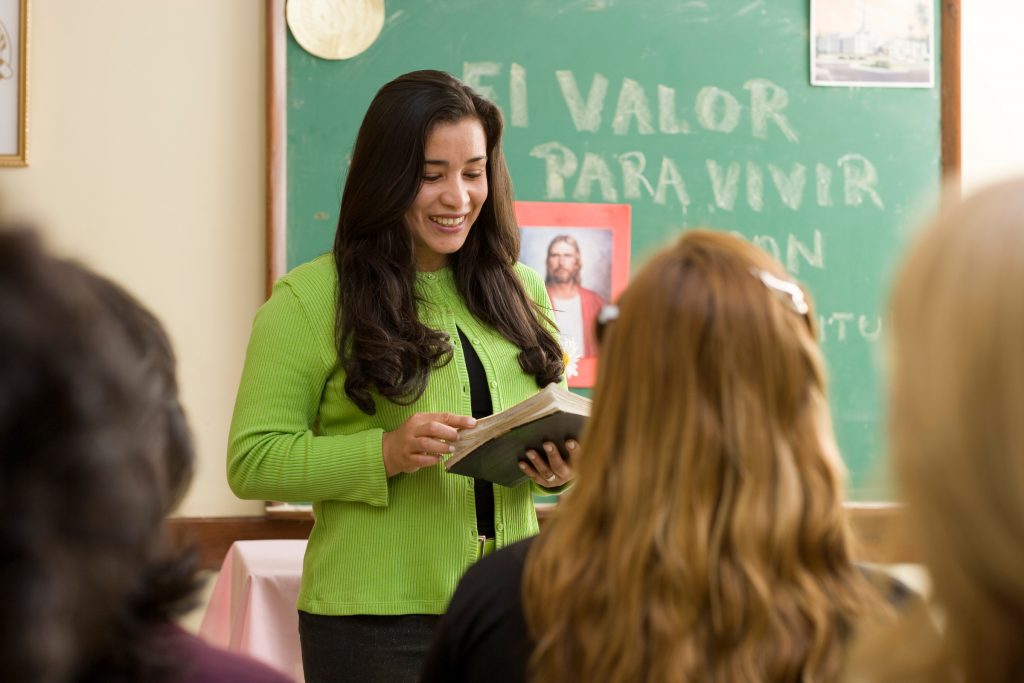Do you use effective questions when teaching the gospel at church or at home?
Imagine you are in Sunday School. Your teacher wants the discussion to go a certain direction that works with his or her notes, but also wants to ask a question to get people involved. In order to drive the discussion, the teacher asks a blatantly obvious question that has only one logical answer, or asks a question with a single answer in mind and picks on people until someone eventually gives the answer he or she is looking for.
Sound familiar?
A good question can be an effective tool for encouraging conversation and pondering, but a poor question can both limit discussion and detract from the Spirit. In his Ensign article “Questioning Our Discussion Questions,” Ted Barnes addresses a few dos and don’ts to consider when asking questions:
- Don’t ask questions that have an obvious answer. Questions should “invite class members into a heartfelt conversation that fosters spiritual learning.” Although teachers typically use obvious questions to communicate important principles, this kind of question most often results in stifled conversations and a disengaged class. A more complex question that requires serious thought, such as the Savior’s question to his disciples, “Whom say ye that I am?” (Matthew 16:15), invites class members to engage in “a heartfelt conversation.”
- Do ask questions that have more than one answer. Questions with one answer may seem like a great way to control the direction of the lesson, but these questions more often turn into a game of “What Does the Teacher Want to Hear?” which can isolate and even offend class members. Asking questions with more than one answer leads to a more meaningful discussion, which “invite[s] the Spirit and enrich[es] the experience for everyone.”
- Don’t ask questions that are too personal. Questions should be motivated by “sincere interest and genuine love.” They should not be used to pressure students into admitting to current or long-repented-of sins or discussing intimately personal experiences in front of a large group.
If you are not skilled at crafting questions, don’t despair. “Even if all you can do is love the people you teach,” says Barnes, “the Spirit will guide you, and you will get better and better at knowing what to say.” As you live worthy of the Holy Ghost’s companionship, you will be able to touch the hearts of your students and “preach with great power” (Helaman 5:17).
Learn more about asking effective questions in Ted Barnes’s article “Questioning Our Discussion Questions.”
Source: lds.org
—Sarah Keenan, Mormon Insights
feature image courtesy of lds media library
Find more insights
Read the section “Ask Inspired Questions” from the manual Teaching in the Savior’s Way to learn more about how to ask questions that inspire students to ponder gospel truths.
Discover how to improve your teaching by reading the Preach My Gospel chapter “How Can I Improve My Teaching Skills?”
Watch the Church’s teaching videos “Asking Follow-up Questions” and “Discussing Questions” for ideas on how to involve youth in thinking about and applying what they are learning.




Asking effective questions is so, so important. I’ve found that discussions make for the most interesting and edifying lessons at church. In the callings where I’ve taught, I found that I learned so much more from the people in class who shared answers to the questions I asked than I ever would have on my own. One of my favorite things is to ask questions that I legitimately don’t know the answer to, and sincerely ask for help understanding. It’s okay for the teacher to not know everything; our job is to love, care, bring the Spirit, and share in the learning process.
This is such a difficult thing for me! I haven’t had to teach for some time, but I dread the day I get a teaching calling again. The more insights look very helpful and I plan to save this article you talk about for later reference. It’s good to be reminded that the spirit can help even me become a better teacher.